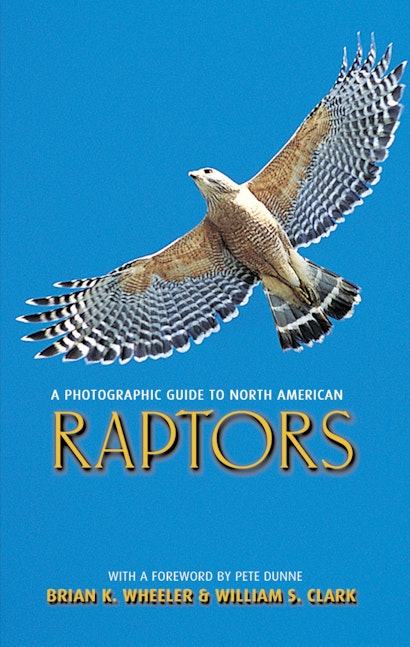Whether soaring or perched, diurnal birds of prey often present challenging identification problems for the bird enthusiast. Variable plumage, color morphs, and unique individual characteristics are just some of the factors bird watchers must consider when identifying the different species. In this authoritative reference, two of the world’s top experts on raptors provide an essential guide to the variations in the species, allowing for easier recognition of key identification points. All the distinguishing marks described have been exhaustively tested in a wide range of field conditions by the authors as well as the colleagues and students who have learned from them.
Key Features?
- The only complete photographic guide to North American diurnal birds of prey
- Includes all species, common and rare
- Written by well-known experts
- Contains 365 photographs, each with an explanatory caption and supporting text describing all 43 species of diurnal raptors found in North America
- Features 14 discussions of specific problems in practical identification
- Complete set showing every plumage
- Raptor I.D. problem section showing similar species side by side
Species List:
Turkey Vulture. Black Vulture. California Condor. Osprey. Hook-billed Kite. Swallow-tailed Kite. White-tailed Kite. Snail Kite. Mississippi Kite. Bald Eagle. Northern Harrier. Sharp-shinned Hawk. Cooper’s Hawk. Northern Goshawk. Common Black Hawk. Harris’ Hawk. Gray Hawk. Red-shouldered Hawk. Broad-winged Hawk. Short-tailed Hawk. Swainson’s Hawk. White-tailed Hawk. Zone-tailed Hawk. Red-tailed Hawk. Ferruginous Hawk. Rough-legged Hawk. Golden Eagle. Crested Caracara. American Kestrel. Merlin. Aplomado Falcon. Gyrfalcon. Peregrine. Prairie Falcon. Crane Hawk. Roadside Hawk. Hawaiian Hawk. Red-backed Hawk. Steller’s Sea Eagle. White-tailed Eagle. Collared Forest Falcon. Northern Hobby. Common Kestrel.
"I highly recommend this useful guide."—Keith L. Bildstein, Auk
"No one is better at the variabilities of raptor identification than this team of two. . . . The excellent photographs are clear and well chosen. . . . If you take your hawk-watching seriously, buy it."—Charles E. Keller, Indiana Audubon Quarterly
"The 377 colour photographs are without exception truly stunning. . . . The plates are conveniently placed next to the relevant species account and show all plumage, both in flight and perched. . . . The authors are to be applauded for their expertise, while not forgetting the problems of the beginner, making this book ideal for both the novice and the profession: there is something new for everyone."—Neil Hayward, Ibis
"As a hawk watcher of long standing, I have eagerly awaited this utilitarian partner to . . . Hawks. First, because as a reference tool, it will be invaluable to serious hawk watchers. The information it contains is age class and subspecies specific; the format is straight forward; and the material is easily referenced. . . . This new guide, with its employment of photos and integrated concern for the problems presented by lookalike species, will also serve the novice, saving them much time, effort, embarrassment, and . . . Frustration! On a global scale, there are few living human beings who know more about birds of prey than William S. Clark and none, to my mind, who know more about their identification. On the more focused subject of North America's diurnal raptors, he has few peers . . . but one of them is Brian K. Wheeler, whose photos dominate this book. . . . There are many nature photographers who specialize in capturing birds of prey on film. Few are as good as Wheeler and some say none."—Pete Dunn, Director, Natural History Information, New Jersey Audubon Society
"Are you having difficulty unraveling the mysteries of identifying birds of prey? If you are baffled by seemingly similar silhouettes of birds of prey, not to mention plumage variations, then A Photographic Guide to North American Raptors . . . is the perfect field guide for you. With this guide in hand, you will be ahead of other birders at hawkwatching hotspots."—Wildbird
"I recommend that you buy two copies, one for home and one for your vehicle."—Canadian Field Naturalist
"This book will change your mind about the importance of photographic guides. You will want to use this guide. Here you are treated to stunning photographs that depicts all the field marks that are mentioned in an informative text. . . . This is one outstanding effort and it is a genuine pleasure to look through this book. Brian Wheeler and Bill Clark are the continent's leading authorities on the field identification of diurnal birds of prey. As such, any work that they produce should be taken seriously. They have consistently produced identification publications that have changed the entire hawkwatching world in a significant and positive manner. This field guide is no exception. It offers a novel approach to the identification of hawks in a wonderfully pleasurable environment. Bravo!"—HMANA Migration Studies
"For the raptor enthusiast or North American birder, this is an essential purchase. . . . The authors and publishers have done their work well."—Paul Doherty, Birding World
"The authors have done raptor aficionados a great service by greatly reducing the problems associated with this often difficult-to-identify group of birds."—Peter H. Bloom, Journal of Raptor Research
"This excellent book is a must-buy for anyone interested in improving their raptor ID skills. I believe it is well worth the price for the high-quality photos alone, but careful review of the test also reveals a wealth of state-of-the-art raptor ID tips that have been field tested by the authors."—Ned Harris, Birding
"Never have I seen a photograph better capture the essence of a birds appearance in flight than the wonderful color photograph of a rough-legged hawk gracing the cover of A Photographic Guide to North American Raptors. . . . This book . . . is filled with such images of birds of prey. The pictures are carefully picked, not just for the aesthetic quality that is virtually inevitable for any good photographs of raptors, but to greatly assist birders in the identification of this sometimes bewildering array of birds. It's a great gift for naturalists."—Barry Kent Mackay, Toronto Star


